|
Keep looking & resist accordingly: The humble Lamb overcomes the boastful Horn
The Presidential election here in the United States is fast approaching, and we are being bombarded by messaging from candidates. Great boasts, overt lies, and hateful rhetoric abound. Candidates and their advocates stir up fear should their opponents be elected. Many are experiencing this as a time of impending doom. Daniel 7 seems highly prophetic for these times, helping us see things from a higher perspective.
Daniel tells of a night vision that appears before him as he “keeps looking.” He writes as a Jewish exile living first in Babylon (modern-day Iraq), and then in Persia (modern-day Iran). His contemporary equivalents might then be underground believers inside Iraq or Iran. He describes a beast with ten horns, dreadful, terrifying and extremely strong that devour, crush and trample down with their feet. Horns are symbols of strength, haughtiness and arrogance. How does Daniel’s vision help us identify these powers today?
Today horns could be incarnate in the rich and powerful, billionaires who own the news and social media, but also in brands, celebrities, teams. They are myriad, principalities and powers manifesting in politicians, political parties, the corporate elite and influencers of many stripes.
While Daniel is contemplating the horns, he describes another horn, a little one pulling out three of the ten horns by the roots. This “horn possessed eyes like the eyes of a man and a mouth uttering great boasts” (Dan 7:8). Where do we hear a human uttering great boasts today?
In our current political climate it is not hard to identify one particular “mouth uttering great boasts,” though there are many. And what this horn does is clearly underway now: “The horn was waging war on the saints and overpowering them” (7:21).
As I read what Daniel sees here, I wonder whether my own fatigue and extreme disillusionment at how so many Christians appear to be co-opted by the political spirit is overpowering me. I know many others who are at the point of losing faith in the church and most anything “Christian,” which we see as being overpowered by political figures who hold them in their grip.
We see so many who claim to follow Jesus, full of fear of immigrants, other vulnerable people, and things deemed “threats” that are being scapegoated. We see people believing promises of a return to some delusion of past greatness. We see people bowing to those Daniel calls beasts and horns—powers associated with national security, superiority, domination and control.
But Daniel next sees an alternate reality not visible apart from revelation. This reality is not audible, or even readable— meaning it doesn’t come through speeches, tweets, posts, or articles that can be heard or read. This revelation comes through spiritual vision. The higher reality it presents puts all the horns in their place—doomed to destruction.
“I kept looking,” writes Daniel, showing the importance of perseverance at the watch stations. Daniel keeps looking “until thrones were set up.” And what he sees next is what we need to focus on now.
“And the Ancient of Days took his seat; His vesture was like white snow and the hair of his head like pure wool. His throne was ablaze with flames, its wheels were a burning fire. A river of fire was flowing and coming out from before him; Thousands upon thousands were attending him, and myriads upon myriads were standing before him; The court sat, and the books were opened” (Dan 7:9-10).
But then following closely after this vision, Daniel keeps looking “because of the sound of the boastful words which the horn was speaking.” Oh no, evil persists!
The sound of boastful words is clearly overwhelming and overcoming many who are listening and reading national and world news right now.
But then what Daniel sees next reveals the final removal of this beasts and these horns.
“I kept looking until the beast was slain, and its body was destroyed and given to the burning fire. as for the rest of the beasts, their dominion was taken away, but an extension of life was granted to them for an appointed period of time” (Dan 7:11-12).
Is this “period of time” the one in which we are now living? We are not given an answer. But the destruction of the beasts and the removal of their dominion is assured, making room for what Daniel sees next as he keeps looking in the night visions.
“And behold, with the clouds of heaven one like a Son of Man was coming, and he came up to the Ancient of Days and was presented before him. And to him was given dominion, glory and a kingdom, that all the peoples, nations and men of every language might serve him. His dominion is an everlasting dominion which will not pass away; and his kingdom is one which will not be destroyed” (Dan 7:13-14).
Daniel is distressed, and asks “someone standing by,” perhaps a divine messenger in the vision. He models prayer for discernment and wisdom, asking “the exact meaning of all this” (Dan 7:16). And Daniel lets us know that this “someone” “told me and made known to me the interpretation of these things,” giving me hope that we can expect to receive wisdom “from above” when we ask for it with faith (James 1:5-6).
The “someone standing by” tells him that four beasts are four kings that will arise from the earth—and we are not told who these are either.
“But the saints of the Highest One, (and not the four kings) will receive the kingdom and possess the kingdom forever, for all ages to come” (Dan 7:18).
But Daniel then keeps looking, and that’s when he sees “that [the] horn was waging war with the saints and overpowering them” (Dan 7:21).
But then I keep looking at what Daniel is seeing as he keeps looking, and my hope begins to return.
Daniel keeps looking “until the Ancient of Days came and judgment was passed in favor of the saints of the Highest One, and the time arrived when the saints took possession of the kingdom” (Dan 7:22).
And here I know Christians following the “little horn” think they will take possession of the kingdom when this horn “wins,” so they can rule from atop the “seven mountains.” But this interpretation becomes impossible when “the one standing by,” who Daniel asked for an interpretation, repeats details about the horn overpowering the saints in ways that show the battle was not (and is not now) over.
The horn that was earlier described as uprooting three of the ten horns (kings) is then described again using language that could describe what is transpiring now in the USA.
“He (the little horn) will speak out against the Most High and wear down the saints of the Highest One, and he will intend to make alterations in times and in law; and they will be given into his hand for a time, times, and half a time” (Dan 7:25).
Speaking out against the Most High can be done indirectly, by speaking in favor of a “most high” presented using Christian language, but which has nothing to do with the Jesus of the Gospels, but is an idol (the image of the beast). I can see the success of this anti-Christ propaganda wearing down of the saints, despondent that so many people who claim to follow Jesus are listening to the little horn and his spokespeople. But the messenger next makes it clear that his horn is doomed to permanent extinction.
“But the court will sit for judgment, and his dominion will be taken away, annihilated and destroyed forever. Then the sovereignty, the dominion and the greatness of all the kingdoms under the whole heaven will be given to the people of the saints of the Highest One; His kingdom will be an everlasting kingdom, and all the dominions will serve and obey Him.” (Dan 7:26-27).
The “Highest One” is none other than the Son of Man, who came as Jesus of Nazareth, called the Lamb of God in John’s Gospel, and the book of Revelation. He will come again to reign forever. This is the one who wins by losing, who identifies his ascent to Jerusalem this way:
“Behold, we are going up to Jerusalem; and the Son of Man will be delivered to the chief priests and scribes, and they will condemn him to death, and will hand him over to the Gentiles to mock and scourge and crucify him, and on the third day he will be raised up” (Mt 20:18-19).
And the saints of the Highest One, who might these be? The Apostle Paul offers the best definition of the saints I’ve found in his greeting to the church in Corinth:
“To the church of God which is at Corinth, to those who have been sanctified in Christ Jesus, saints by calling, with all who in every place call on the name of our Lord Jesus Christ, their Lord and ours” (1 Cor 1:2).
In the Book of Revelation John receives revelation similar to Daniel’s, of ten horns who are ten kings, who “receive authority as kings with the beast for one hour” (Rev 17:12). Are we living now in this hour? We are not given an answer. But what we do know is this:
“These (kings/leaders) have one purpose, and they give their power and authority to the beast. These will wage war against the Lamb, and the Lamb will overcome them, because he is Lord of lords and King of kings, and those who are with him are the called, chosen and faithful” (Rev 17:13-14).
And who are these “called, chosen, and faithful?” They are none other than the Saints described in Daniel 7, those who haven’t bowed to the beast, who demands their allegiance. These “called,” and “chosen” Paul also writes about in 1 Corinthians 1:26-29.
“For consider your calling, brothers and sisters, that there were not many wise according to the flesh, not many mighty, not many noble; but God has chosen the foolish things of the world to shame the wise, and God has chosen the weak things of the world to shame the things which are strong, and the base things of the world and the despised God has chosen, the things that are not, so that he may nullify the things that are, so that no one may boast before God.”
May we seriously consider who we choose to identify with in these treacherous times, refusing anything resembling a boastful horn, choosing instead the humble servant King Jesus. May we seek and find community within the humble yet resisting assembly of the saints: the called, chosen and faithful.
Jesus loves and heals his enemies, undoing the rule of darkness
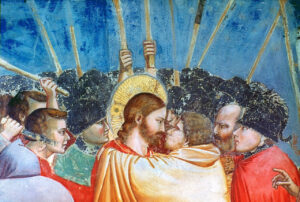 Jesus’ encounter with Judas and his healing of the Jewish High Priest’s servant at his arrest offer a life-giving alternative to the warring factions in the Middle East, Christian supporters of the State of Israel now, and partisan hatred as the US moves towards its presidential election.
Jesus’ encounter with Judas and his healing of the Jewish High Priest’s servant at his arrest offer a life-giving alternative to the warring factions in the Middle East, Christian supporters of the State of Israel now, and partisan hatred as the US moves towards its presidential election.
Israel’s retaliatory strikes against Hamas, Hezbollah and the Houthis, and soon Iran, couldn’t contrast more with Jesus’ self-giving love– which we expect since the majority of Israelis do not believe Jesus is their Messiah. Yet Jesus calls this way of violence “the authority of darkness.” He did not justify violence, but effected a surgical strike to destroy it’s authority through his crucifixion, modeling to us his followers the only effective retaliation– self-giving love.
Nowhere in the Gospels do we see Jesus physically defending himself against persecutors, or justifying violence in defense of Israel or his followers! No wonder he was rejected then and now– but not by everyone!
Jesus confronted two of his disciples at the moment of his arrest– Judas his betrayer and Peter, his defender. He named Judas’ action of betrayal, while allowing himself to be kissed and handed over. His last miracle was to heal the ear of the High Priest’s servant, reversing Peter’s attempt to protect him, before ordering Peter to put away his sword.
It is time for those who claim to follow Jesus as Israel’s Messiah (Christ) and the world’s Savior to break with the authority of darkness, and choose to align with his radical authority of light.
Philemon of Gaza brilliantly expresses this in his following commentary of Luke 22:47-53, available here.
“Not all kisses are false, but Judas’s was; it is more precisely hypocritical because it hid something else behind the apparent love. A true kiss expresses only love from the heart (Song 1:2)18 but Judas’ kiss contained betrayal, as Jesus showed him, telling him what he saw in his heart: “With a kiss you betray me.” Jesus was not content with unmasking Judas’ hypocrisy; he did so while showing him true love through the words he spoke to him. Jesus, in fact, addressed the traitor by name, “Judas,” and referred to himself as “the Son of Man.” Judas could hardly forget that Jesus had done the same with Zaccheus, addressing him by name (19:3) and speaking of himself as the Son of Man (19:10); this was the way he spoke when he came to find in Zaccheus a lost sheep. And this is what Jesus was doing here: he was looking for his lost sheep named Judas. What love and what mercy towards Judas, who thereby discovered the extent of the love with which he was loved. O my soul, Judas came to betray Jesus, and Jesus came to save Judas! One embraced with hypocrisy, and the other embraced with indescribable love, divine love, which over- flowed with infinite mercy.
The infinite love of Jesus is manifested again here, not only by a kiss, but by an extraordinary miracle. Jesus, in fact, healed the ear of the high priest’s servant. This is truly extraordinary because this is perhaps the first time that Jesus performed a miracle for someone who did not believe in him. We could even say that, on the contrary, the servant considered Jesus a bandit, to use Jesus’ own word. The servant came to arrest, not the Son of Man, but a bandit who was pretending to be the Son of Man. During the arrest, someone close to Jesus cut off the man’s ear, but there is no indication that he turned to Jesus asking for healing. The man did not expect a miracle, and yet Jesus healed him, without saying anything, with infinite love, divine love. What inexpressible compassion for this man, who now suddenly discovered the love with which he was loved! O my soul, this servant came to arrest Jesus, and Jesus came to save him. No doubt he converted, because his name, Malchus, is cited elsewhere (Jn 18:10), suggesting that he must have been part of the first Christian community.
An astonishing contrast appears here, as revealed by Jesus at the end of this passage, the contrast between the authority of the Son of Man and the authority of darkness. Judas had fallen under the authority of darkness, under the authority of the prince of darkness, the authority of the Liar who, one day, even dared to propose to Jesus that he give him this authority (Lk 4:6). Judas submitted to the authority of darkness and became a man of darkness. In contrast to this authority, we see here the Son of Man, who received all authority from God and who manifested his authority in a miracle for another man of darkness, a miracle done with an authority greater than that of the Evil One. Jesus’ divine authority is the authority of love, not of lies or the sword. Jesus calls on his people to sheathe the sword, which only wounds, because love is stronger than everything and heals what the sword has wounded. The love of Jesus is so great that it touches even the heart of an enemy. This is the first time that Jesus had performed a miracle for an enemy. In this way, he here teaches us love of enemies. He teaches it by practicing it himself. He performed this miracle at the very moment the disciples fled (Mt 26:56). They would carry away in their hearts this unforgettable example of deep love as they went.
O my soul, it is the hour of darkness, Jesus tells us here, the hour when darkness begins to settle in and will thicken until it covers the whole earth at the time of the cross (Lk 23:44). But, in this darkness, the Son of Man already shines with the glory with which he will shine on the day he returns. Jesus is here, a man of light among the men of darkness; he is here, the light of the world (Jn 8:2), which shines before our eyes and which we can contemplate; here he is, his heart filled with love for a lost sheep that he does not want to abandon, his heart filled with love for a servant of whom he makes himself a servant by healing his ear cut off by a sword. He is present wordlessly, without a weapon, facing those who come to arrest him with swords and staves. He is present, overflowing with a love that eclipses the hypocritical love of a kiss. He is present before us with a love so great that there are no words to describe it. O my soul, let us prostrate ourselves before him and contemplate him.
You are blessed, Lord Jesus, you, the light of the world who shine here with all the brightness of your love . . .”
 The danger of so-called “Christian Nationalism” is real– and especially now! This course below explains what it is, and how the way of Jesus is radically different. Deep and Wide Academy is hosting this new course, which offers:
The danger of so-called “Christian Nationalism” is real– and especially now! This course below explains what it is, and how the way of Jesus is radically different. Deep and Wide Academy is hosting this new course, which offers:
- Challenges to unexamined assumptions about Nationalism, Militarism, and Idolatry
- An understanding of the current political climate in the context of these idolatries
- Counsel on how to live in an alternative, Jesus-centered community and mission
Sign up for this online video course here. Use the coupon code JESUSORNATIONALISM until November 6 for a 50% reduction in course fee of $29.99.
In addition: The People’s Seminary is offering our annual Zoom “Certificate in Holistic Liberation” (Module 1), beginning October 8, and continuing for 12 Tuesdays, 10:30am-12:00pm (PST). If you are unable to attend the live sessions, we are offering a special course which will be uploaded for you to go through at your own pace and on your own schedule. For more information or to sign up, click here.
Fleeing idolatry in a time of pretender saviors
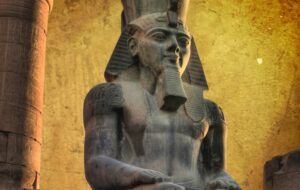 Many people have rightly sounded the alarm about the rise of Christian nationalism in the USA. Yet the growing idolatry of the person of Donald Trump (and other authoritarian leaders in other nations) among people who call themselves Christians also must be called out and resisted. What is at the root of this adoration of the “strong man”?
Many people have rightly sounded the alarm about the rise of Christian nationalism in the USA. Yet the growing idolatry of the person of Donald Trump (and other authoritarian leaders in other nations) among people who call themselves Christians also must be called out and resisted. What is at the root of this adoration of the “strong man”?
I find myself recalling in detail the seminary courses in psychoanalysis and pastoral care we took in France. There we learned that a newborn child focuses all its needs on the mother. But as, gradually, the infant perceives that the mother is ‘weak’ – meaning, she seems also to feel desire for someone other than the infant, namely the father – the child begins to orient herself to the father, or whoever fills the place of the father. In time, however, the child begins to see that the father, too, is ‘lacking’ – that he is not all-powerful and complete in himself.
Unconsciously, the child denies this awareness and deep inside yearns for a more powerful ‘father’. This leaves an opening for idolatry – the ‘worship’ of a surrogate or pretender ‘father’ who seems to offer security or even power to anyone insecure in their identity.
The authoritarian leader presents as all powerful, satisfying a need in adherents for defense from perceived enemies, financial success, innocence before accusers (and revenge against them), control over the unknown, and supreme power.
The all-powerful authoritarian can never admit losing, wrong-going or failure, and must be right, successful, in total control, and unstoppable, offering loyal subjects a kind of psychological and spiritual covering they feel they need.
The breakdown of the family resulting in an increase in single-parent households, and absence of a father has certainly led to a kind of “father hunger,” visible in the rise of criminal gangs. Equally this father hunger lurks behind political party loyalties, nationalism, White (and other) ethnic supremacy movements, and the success of many “influencers” to lead people astray. See this fascinating article “Why the world is attracted to neo-authoritarian leaders.”
The prophet Samuel led Israel, the people of God, during a time of political instability. As he got older and weaker, and his sons looked like lame successors, God’s people expressed to Samuel their desire for a king so they could be “like the other nations.” Samuel was highly disturbed by their choice, to which the Lord responded:
“Listen to the voice of the people in regard to all that they say to you, for they have not rejected you, but they have rejected me from being king over them” (1 Sam 8:7).
Here God’s respect for human choice seems strangely “democratic,” in that God gives the green light to Samuel to give them who they are electing. Yet the Lord offers a stunning critique that seems highly relevant now. He identifies their choice as idolatry, adding:
“Like all the deeds which they have done since the day that I brought them up from Egypt even to this day — in that they have forsaken me and served other gods — so they are doing to you also” (1 Sam 8:8).
God identifies the people’s desire for a powerful king as idolatry, which evokes the first of the ten commandments in Exodus 20:1-4.
“I am the Lord your God, who brought you out of the land of Egypt, out of the house of slavery. You shall have no other gods before me. You shall not make for yourself an idol, or any likeness of what is in heaven above or on the earth beneath or in the water under the earth” (Ex 20:2-4).
Here in 1 Samuel 8, the Lord makes a direct connection between people’s desire for a king (or president) and idolatry—placing something or someone else “before” or “in the place of” the only Creator, the Father, who alone brings people out of “slavery.”
God tells Samuel to let the people have the king they desire, but to warn them of the consequence:
“Now then, listen to their voice; however, you shall solemnly warn them and tell them of the procedure of the king who will reign over them” (1 Sam 8:9).
The prophet Samuel offers a scathing critique to the people. And the prophet Jeremiah too speaks to God’s people of the consequences of trusting in a human being.
“Cursed is the person who trusts in man (humankind, Hebrew- adam), and makes flesh his strength, and whose heart turns away from the Lord. For that one will be like a bush in the desert and will not see when prosperity comes, but will live in stony wastes in the wilderness, a land of salt without inhabitant” (Jer 17:5-6).
This stands as a solemn warning to voters now. Yet people who claim to follow Jesus must be clear about the alternative we offer.
As followers of Jesus, we confess by faith that he is the Son of God who most fully reveals the Father (Jn 1:18; 14:6; Col 1:15), to whom we owe full allegiance. Jesus came also as Israel’s King, a title placed over his head at his crucifixion, and when he is lauded “King of kings” (1 Tim 6:15; Rev 17:14; 19:16). He is the world’s Savior, the only one who has defeated death, and who will destroy every ruler, authority and power (1 Cor 15:24), when the Kingdom of God is fully established.
We must remember though that Jesus was rejected by the religious leaders of his time, and largely by God’s people- who were easily influenced to call for his execution. Jesus did not offer people the security of the rule of law they desired, embodied by the scribes and Pharisees. Jesus refused violence (even against the Roman Empire), and all forms of political power. He calls his disciples into the same posture:
“You know that the rulers of the Gentiles lord it over them, and their great men exercise authority over them. It is not this way among you, but whoever wishes to become great among you shall be your servant, and whoever wishes to be first among you shall be your slave; just as the Son of Man did not come to be served, but to serve, and to give his life a ransom for many” (Mt 20:25-28).
Jesus reveals a Father who comes in humility, pouring out his life in service to others, seeking and saving that which is lost, at the cost of his very life. The Apostle Paul alerts us that “the word of the cross is foolishness to those who are perishing, but to us who are being saved it is the power of God” (1 Cor 1:18).
Confessing Jesus as the world’s Savior, as King, and as Son of God who reveals the Father means placing him at the highest place, “far above all rule and authority and power and dominion, and every name that is named, not only in this age but also in the one to come” (Eph 1:21). This requires dethroning from our hearts all false, pretenders—idols that aggressively pursue for our allegiance—whether that be individuals (politicians, presidents, influencers, celebrities, billionaires) or institutions (USA or any nation, democracy, political parties) or powers (money, stock market, military) or anything in all of creation. Paul identifies idolatry as predatory, advising: “flee from idolatry” (1 Cor 10:14).
However just like someone in active addiction cannot be simply told “stop using!”, we must seek and promote healing from the traumas and wounds to our souls that make us susceptible to addictions, or to false father substitutes.
Now in this time of political and economic uncertainty it is time to confess Jesus as President of presidents, pledging our allegiance to him, and not to earthly alternatives. He is the Prince of Peace, and we must deliberately elect to “let the peace of Christ rule in your hearts” (Col 3:15). It is this peace that offers true security, far beyond what any human leader or system can offer. Loving the Lord our God with all of our heart, soul, mind and strength will lead to the outcome described in Jeremiah 17:7, which goes far being the prosperity or security that the Make America Great Again agenda or the Democratic Party are able to offer.
“Blessed is the person who trusts in the Lord and whose trust is the Lord. “For that one will be like a tree planted by the water, that extends its roots by a stream and will not fear when the heat comes; But its leaves will be green, and it will not be anxious in a year of drought nor cease to yield fruit” (Jer 17:7-8).
The People’s Seminary is offering our annual Zoom “Certificate in Holistic Liberation” (Module 1), beginning October 1, and continuing for 12 Tuesdays, 10:30am-12:00pm (PST). If you are unable to attend the live sessions, we are offering a special course which will be uploaded for you to go through at your own pace and on your own schedule. For more information or to sign up, click here.
Seeking Lost Sheep Revisited: New Thoughts on Luke 15:1-7
For years and years Jesus’ Parable of the Lost Sheep has moved me, inspiring me to be like the persistent Shepherd, Jesus himself. Now it’s speaking to me afresh.
Just prior to Jesus telling of this parable, Luke describes tax-collectors and sinners coming close to Jesus to listen to him– prompting negative reactions from the Pharisees and scribes.
“Now all the tax collectors and the sinners were coming near him to listen to him. Both the Pharisees and the scribes began to grumble, saying, ‘This man receives sinners and eats with them’”(Luke 15:1).
I assume Jesus tells them all this parable, which begins with a question that seems to assume each would answer in the same way.
“What person among you, if he has a hundred sheep and has lost one of them, does not leave the ninety-nine in the open pasture and go after the one which is lost until he/she finds it? When he has found it, he lays it on his shoulders, rejoicing” (Lk 15:4-5)
I notice a few details that catch my attention.
First, in response to the religious people’s disgust that he is receiving and eating with unclean, undeserving sinners—the “them,” Jesus puts the responsibility on the shepherd for having lost the sheep in his parable, not on the sheep for having gotten lost.
Even though the lost sheep clearly designates individual tax collectors and sinners (at least from the perspective of the Pharisees and scribes), separated out from the collective categories of “tax-collectors and sinners,” Jesus refuses to blame them (even if the lost sheep could represent a Pharisee or a scribe)!
Regardless of who the lost sheep designates, if Jesus represents the shepherd in the parable, he takes the blame for having lost each individual sheep. If Jesus includes the Pharisees and scribes as among the “shepherds of Israel, then it looks to me like he actively seeks to inspire them through this parable to seek after lost sheep until they are found as core to their vocation.
Jesus’s shepherd example evokes the prophetic critique of the shepherds of Israel, though he refuses to put them on blast as Ezekiel does:
“Woe, shepherds of Israel who have been feeding themselves! Should not the shepherds feed the flock?… “Those who are sickly you have not strengthened, the diseased you have not healed, the broken you have not bound up, the scattered you have not brought back, nor have you sought for the lost; but with force and with severity you have dominated them. They were scattered for lack of a shepherd, and they became food for every beast of the field and were scattered…. My flock was scattered over all the surface of the earth, and there was no one to search or seek for them” (Ez 34:2, 4-5, 6).
Second, Jesus knows that his listeners (familiar with the shepherding business) would see a non-human possession like a sheep as highly valuable. He hopes to help his audience (including you and me) see that any one person viewed as being separated from the flock is equally valuable enough in Jesus’ eyes to be sought after until found– regardless of whether they’re devoted believers, sinners or criminals, even if that means leaving the 99.
Third, there in the setting of the parable, Jesus hasn’t just been out seeking and finding lost sheep. Rather, tax-collectors and sinners are “coming near to him to listen to him.” And Pharisees and scribes are there listening too.
Yet in Jesus’ parable he describes the shepherd bringing back and celebrating the sheep he found in a way that brings his listeners right back into the house where they are gathered:
“And when he comes home, he calls together his friends and his neighbors, saying to them, ‘Rejoice with me, for I have found my sheep which was lost!’ (Lk 15:6).
There Jesus is gathered with tax collectors, sinners, Pharisees and scribes, all together. Who are the equivalents then and there of the shepherd, lost sheep, friends, and neighbors?
In the opening verse of Luke 15:1 the tax-collectors and sinners are coming close to Jesus, listening to him. He’s receiving them and eating with them. The Pharisees and scribes are there too. However, they are not celebrating what Jesus is doing. They are grumbling. Unless they change their way of thinking, they won’t find themselves represented in the parable— except if they’re among the 99 sheep left in the open field (who feel no need of repentance). But Jesus the Good Shepherd is there with them too!
Jesus first speaks personally to his listeners; “I tell you that…,” before enlightening them about how the joy of the successful shepherd aligns fully with the priorities of heaven—the Kingdom of God:
“In the same way, there will be more joy in heaven over one sinner who repents than over ninety-nine righteous persons who need no repentance” (Lk 15:7).
Jesus’ pastoral brilliance astounds me. He refuses all judgment, inviting his listeners, sinners and religious adherents together, to consider the work of God. Will they (you and me included) engage in the work of seeking, finding, bringing back, and celebrating the return of people, one at a time, who have been lost? Will we join Jesus at the table in joy, celebrating those who have been found, brought back, or drawn close to listen?
Might the shepherd here in this parable be “the one sinner who repents,” by leaving of the ninety-nine to seek after the lost one until found? Will we, ourselves repentant, become part of Jesus’ movement of proclaiming a baptism of repentance, for the forgiveness of sin?
Might we also be one of those lost sheep, whose repentance might consist of surrendering to the Shepherd, who brings us back to celebrate our being found? And if so, what might that repentance look like?
In Jesus’ parable, the lost sheep that was found by the shepherd does not visibly repent. The only active agent in the parable is the shepherd himself, who clearly functions as a kind of agent of repentance.
We can change our way of thinking and acting in alignment with Jesus by becoming more active disciples. We can let the Good Shepherd deputize us, and join him as he embodies God’s mission to seek and to save that which is lost, as in Ezekiel 34.
“Behold, I myself will search for my sheep and seek them out. As a shepherd cares for his herd in the day when he is among his scattered sheep, so I will care for my sheep and will deliver them from all the places to which they were scattered on a cloudy and gloomy day…. I will feed my flock and I will lead them to rest,” declares the Lord God. I will seek the lost, bring back the scattered, bind up the broken and strengthen the sick” (Ez 34:11-12, 15-16).
We can also join the company of tax-collectors and sinners and draw closer to Jesus to listen to him now. If we find ourselves grumbling against Jesus like the Pharisees and scribes, we can repent, changing our minds and hearts (the true meaning of metanoeo- to repent) as we are touched by Jesus’ active pursuit, embrace, and celebration of us (and them), joining heaven’s celebration as the repentance movement grows.
Join us for a new Certificate in Holistic Liberation online cohort via Zoom, beginning October 1 for 12 Tuesdays, 10:30am-12:00pm. For more information or to sign up, click here.
A Surprising Key to Intercession: First Receive from Jesus Ourselves
This Wednesday at our weekly Tierra Nueva Bible study, we experienced surprising new understanding of Mark 7:24-30. In this difficult story, Jesus gives a jarring response to the Syrophoenician woman, who asks him to cast an unclean spirit out of her daughter.
First, Jesus heads into the region of Tyre in modern day Lebanon, 12 miles from the Israeli border, a city which has recently been targeted by Israeli airstrikes. Jesus went into a house there to get away from the crowds. Mark specifies that “he wanted no one to know of it; yet he could not escape notice” (Mk 7:24).
A woman whose little daughter had an unclean spirit somehow hears that he’s there, and “immediately came and fell at his feet” (Mk 7:25).
Mark specifies that this woman was a Gentile of the Syrophoenician race. As such, she was not considered as one of God’s people- the children of Israel, but rather as a religious and social outsider, and unclean. Her daughter had an unclean spirit.
Though Jesus’ first miracle in this Gospel is casting out an unclean spirit (Mk 1:23-26), the beneficiary is a Jewish Synagogue attendee. Jesus later sends out his disciples to cast out unclean spirits in the villages of Galilee (Mk 6:6-7), but there’s no mention of this ministry being only for Jews.
There at his feet, the Gentile woman “kept asking Jesus to cast the demon out of her daughter” (Mk 7:26). So why didn’t Jesus immediately respond and free her daughter?
As a parent I can relate to this woman’s desperation to see her child freed. The parents present at our Bible study have all experienced times of desperation, where we’d prayed continuously for our children. We’d be willing to do anything, including falling at Jesus’ feet if he were here. As we read together Jesus’ response to her, we find ourselves at a loss, unable to understand, for the longest time.
“He said to her: “Let the children be satisfied first, for it is not good to take the children’s bread and throw it to the dogs.”
Why does Jesus appear so mean to this poor, desperate woman? As people involved in a ministry which advocates and pray for many desperate people, we find ourselves wanting to come to her defense—to challenge Jesus. I find myself wanting to advocate for this woman and her daughter based on my conviction that she is entitled to Jesus’ help.
After all, Jesus came as a light to those sitting in darkness, including those in “Galilee of the Gentiles” (Mt 4:12-16). He came to preach the Gospel to the poor, to proclaim freedom to the captives” (Lk 4:18). She and her daughter certainly are included in these categories! So why is Jesus excluding them, and referring to them as “dogs”?
Omi, who oversees a men’s recovery house, mentions that he thinks “dogs where a category of people seen as unclean by the religious Jews because they were outside the faith.” People struggling with addictions today are literally identified as “clean” or “dirty” depending on whether they are in active recovery or not.
Carol, a White woman in her early 80s, who lost a 10 ½ year-old girl and 13 ½ year-old boy 18 months apart from a degenerative nerve disease NLD, looks up from her Bible and comments: “It seems important that she calls Jesus Lord.”
Emmanual, a man who has attended Tierra Nueva for twenty years suddenly pipes up: “I’ve got it!” As a Black man from inner-city Chicago, Iraq war veteran and recovered alcoholic, his vibrant faith born of untold suffering gives him a unique angle on Scripture and a special authority—so we all listen as he explains.
“This woman says: “Yes Lord!” doesn’t she?! She addresses him as God, which suddenly makes her one of the children who receives the bread first!”
Carol, scrutinizing the notes in her study Bible through her reading glasses, tells us that this is the only time in Mark’s Gospel where anyone addresses Jesus as “Lord” (kurios—the Greek translation for God’s name in the Old Testament). I later confirm that this is in fact the case!
Emmanual’s insight and Carol’s discovery suddenly shift the whole conversation, and we’re excited. While the woman was advocating for her daughter, Jesus wants to give to her. He wants a relationship with her, and with us! While her presence interceding at his feet for her afflicted daughter would eventually be addressed, her seeing Jesus for who he is, there in the house where he’s trying to hide, gets his attention.
And her next words to Jesus get my attention: “Even the dogs under the table feed on the children’s crumbs” (Mk 7:28).
There is no hint of entitlement in this Gentile woman’s response. Rather she agrees with Jesus, despite my protests, and humbles herself with no resistance, by comparing herself to a dog eating the children’s little crumbs that have fallen under the table.
Philemon of Gaza writes beautifully of this woman’s humility in his commentary on Mark’s Gospel.
“Humbled, she accepted the insult with great humility, so great indeed that she considered herself not so much humiliated as honored. Instead of feeling rejected, she felt welcomed into the house, as a dog, yes, but that mattered little since it was enough for her to be there with the dogs, under the table, in the lowest place, so long as she could receive her share of the bread in the way children have theirs. Her share was mere crumbs, but that was enough to go away fed. She was so humble that she was happy with the crumbs or, more precisely, “tiny crumbs” (psichion) according to the way she spoke to him, using the diminutive for “crumbs” (psix). What extraordinary humility in this woman, satisfied with tiny crumbs fallen from the table of the Lord!”
“Because of this answer go,” says Jesus. “The demon has gone out of your daughter.”
Jesus gives the woman the credit for her daughter’s liberation: “because of this answer.” Jesus honors the woman before us all. He tells her that because of her answer (showing that she accepted his word, saw him and addressed him for who he is, and humbled herself), the demon has left her daughter. There is no mention of Jesus casting it out, as she had requested. It leaves her daughter because she has received the bread first, as one of the children there in the house. She leaves in child-like faith, without questioning or doubting.
“And going back to her home, she found the child lying on the bed, the demon having left” (Mk 7:30).
 I go home wanting to pray differently, inspired by this woman’s radical humility and faith.
I go home wanting to pray differently, inspired by this woman’s radical humility and faith.
Preparing the way for Jesus— and not for a false Christ, or the next US (or any) President
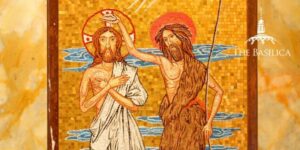 “Prepare the way of the Lord!” writes Isaiah the prophet– and John the Baptist does this, announcing Jesus. He identifies Jesus as Israel’s Messiah, God’s own Son, the lamb of God, Savior of the world, coming King. He baptizes Jesus, points his own disciples to him and defers to him: “He must increase, but I must decrease” (Jn 3:30).
“Prepare the way of the Lord!” writes Isaiah the prophet– and John the Baptist does this, announcing Jesus. He identifies Jesus as Israel’s Messiah, God’s own Son, the lamb of God, Savior of the world, coming King. He baptizes Jesus, points his own disciples to him and defers to him: “He must increase, but I must decrease” (Jn 3:30).
Today far too many Christians are actively preparing the way for their presidential candidate, or political party of choice (and even worshipping them). There is lots of anxiety about what’s going on in our country, and in the larger world—and there are good reasons for deep concern! Clear discernment is needed, and faith and courage.
How can we as disciples of Jesus avoid getting distracted from our highest calling and purpose in life? John the Baptist models prophetic witness that clears the way so we can see and welcome Jesus’ humble Kingdom in our midst—refusing all seductive, deceiving pretenders.
John the Baptist did not prepare the way for religious movements like the Pharisees, Sadducees or zealots, nor did he endorse political figures like Herod, Pilate, or Caesar. Rather, he exposed their abuses, resulting in his incarceration and execution by Herod, who later colluded in Jesus’ crucifixion.
John accomplishes Isaiah 40:3 by recruiting people into a movement of repentance. The Gospels present John as “the voice of one crying in the wilderness” (Lk 3:4). What John the Baptist cries out is an order that directly engages all of us: “prepare ye the way of the Lord, make straight the paths of our God.”
John uses plural imperatives “prepare!” and “make straight!” recruiting each of us to get ready, and ready others, for a particular liberator, Jesus, the Savior of the world. This implies not preparing the way for anyone else, and actively discerning and refusing false saviors!
According to John the Baptist, preparing for Jesus involves rebirth into a new identity and way of thinking, which requires regular confession of sin and active receiving of forgiveness.
“Preaching a baptism of repentance for the forgiveness of sins” is mentioned often in Luke and Acts (Lk 3:3; Acts 13:24; 19:4), and is emphasized in Jesus’ final instructions in Luke 24:47 “that repentance for forgiveness of sins would be proclaimed in his name to all the nations, beginning from Jerusalem.” John’s prophetic role to call people to prepare the way for Jesus continues to be ours too. So we have much learn from him.
John the Baptist modeled prophetic discernment regarding Jesus, by asking Jesus directly to clarify his identity. From his prison cell, John apparently wondered whether Jesus was for sure the awaited Messiah whom he had endorsed. After all, Jesus wasn’t protecting his freedom of religion, or freeing him from persecution and prison. Nor was Jesus freeing Israel from oppression under Herod, Pilate, Caesar and the Roman Army.
While in prison for exposing Herod’s injustices, John sent two of his disciples to ask Jesus directly: “Are you the Expected One, or do we look for someone else” (Luke 7:20)?
“At that very time he cured many of diseases and afflictions and evil spirits; and he gave sight to many blind” (Lk 7:21). He alerts the men to signs associated with the God’s anointed Messiah:
“Go and report to John what you have seen and heard: the blind receive sight, the lame walk, the lepers are cleansed, and the deaf hear, the dead are raised up, the poor have the gospel preached to them. Blessed is he who does not take offense at me” (Lk 7:22-23).
Do you see any of these signs accompanying politicians hailed as God’s candidates today?
Jesus goes on to further clarify extreme humility as a core quality associated with his presence and coming Kingdom.
After John’s two disciples left, Jesus spoke to the crowd about John the Baptist:
“What did you go out into the wilderness to see? A reed shaken by the wind? “But what did you go out to see? A man dressed in soft clothing? Those who are splendidly clothed and live in luxury are found in royal palaces! But what did you go out to see? A prophet? Yes, I say to you, and one who is more than a prophet” (Lk 7:24-26).
In this endorsement of John, Jesus differentiates John from the power and pomp of his era, and certainly from today’s billionaire politicians and their endorsers. But Jesus’ next remarks take us to a whole new level of “not-of-this-world” humility.
“I say to you, among those born of women there is no one greater than John; yet he who is least in the kingdom of God is greater than he.”
Here Jesus declares that John is greater than himself, since he too was born of a woman, as Paul himself specifies in Galatians 4:4:
“But when the fullness of the time came, God sent forth His Son, born of a woman, born under the Law…”
Philemon of Gaza, a sixth-century monk, makes the startling observation about Jesus in his commentary on Luke (forthcoming).
“Here he is telling us that John the Baptist is greater than he is. This humble Jesus bows before the one who prepared his way in the desert and in our hearts. What humility! O my soul, Jesus bows even deeper; he who bowed before the hand of the one who baptized him, now also bows before the least of his brothers in the Kingdom of God. Behold, the least in the Kingdom is greater than John the Baptist and greater than Jesus. No one could be more humble than him [Jesus].”
Reading Philemon of Gaza’s reflections here have shocked and inspired me, inviting me to contemplate a level of humility I hadn’t dared to consider. Might this very humility of Jesus be the most essential sign identifying him as the Expected One?
The humble divinity revealed in Jesus evangelizes us, training us to welcome the true Presence and Kingdom of God. Becoming disciples of Jesus and preparing the way for him, requires that we refuse and disassociate ourselves from the false, pretender liberators and their endorsers (and even worshippers), who cry out through the media and in myriad ways today. Philemon of Gaza continues his reflection by drawing in Paul’s reflection on Jesus’ humble divinity.
“As the holy apostle Paul tells us, a humble person is one who considers others greater than themselves (Phil 2:3). Jesus truly made himself the most humble, and so God also sovereignly exalted him and gave him the name that is above every name, so that at the name of Jesus every knee should bow in heaven and on earth and under the earth, and every tongue confess that Jesus Christ is Lord, to the glory of God the Father (Phil 2:9). O my soul, it is he who speaks to us here, and we hear his gratitude expressed to all who bow the knee before him.”
May we re-orient ourselves afresh to our vocation to prepare the way for Jesus. May we become students of his radical humility through study of the Gospels, regular confession, repentance and actively receiving and offering forgiveness. May we proclaim and live out a liberating alternative to the many false ways and imposters that abound today, fixing our gaze on Jesus, the author and perfecter of our faith (Hebrews 12:2).
Check out my recent podcast “Get ready for God’s Endgame Jesus’ Way: A response to Lance Wallnau and the Courage Tour.”
Philemon of Gaza Meditates Mark’s Gospel, is now available as an Audiobook here, as is Daniel Bourguet’s The Humble Divinity of Jesus in Mark’s Gospel, Volume 1 and Volume 2 paperback, e-book and Audiobook versions.
Check out my podcast “Disciple: Word, Spirit, Justice, Witness” on Spotify or Apple.
Discovering Jesus’ Humble Divinity
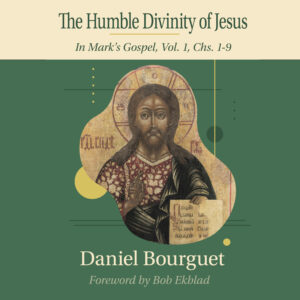 In these times when much damage is done in the name of Jesus, I have been rediscovering Jesus’ humble divinity in the Gospels. I long to see others discover Jesus’ Divine-human identity afresh– a revelation that I believe will compel many to become his disciples.
In these times when much damage is done in the name of Jesus, I have been rediscovering Jesus’ humble divinity in the Gospels. I long to see others discover Jesus’ Divine-human identity afresh– a revelation that I believe will compel many to become his disciples.
Daniel Bourguet’s excellent books The Humble Divinity of Jesus in Mark’s Gospel, Volume 1-2 have been particularly enlightening. I have just been especially blessed reading these books aloud as audiobooks for Audible, to add to The People’s Seminary Press’ paperback and e-book version (links below). Check out this beatiful treatment of Jesus’ words to the paralytic in Mark 2:11.
“I say to you
“When Jesus said to the paralytic: “Rise, take up your bed and go to your home” (2:11), he introduced what he was saying with the words, “I say to you.” We will pause over this expression.
“I say to you”: it is astonishing to see here that Jesus doesn’t invoke anyone’s name to tell the paralytic to stand up. Peter would later say to a sick man, “In the name of Jesus Christ of Nazareth, rise up and walk” (Acts 3:6); he would likewise say that the forgiveness of sins should be received “in the name of Jesus” (Acts 10:43). Paul would do the same as Peter and so say to an evil spirit, “In the name of Jesus Christ, come out of this woman” (Acts 16:18).
The difference between Peter and Paul on one hand and Jesus on the other is huge. Peter and Paul relied on the authority of another, Jesus, to bring about a miracle or to announce the forgiveness of sins. In contrast, Jesus relied on no one to forgive or to perform a miracle, having the authority himself. He is “the Son of Man who has authority to forgive sins,” just as he had authority to call upon the paralytic to stand up. He has the authority as the Son who has received the authority of his Father at the heart of the Trinity.
In Mark’s gospel, Jesus never either performs a miracle or speaks “in the name of God” as did the prophets. Jesus is more than a prophet. His “I say to you” spoken to the paralytic has the authority and power of a divine word. The power of the Word of God means that what it announces is accomplished, as at creation: “God said ‘Light be,’ and the light was” (Gen 1:3). That is what is happening here: Jesus says to the paralytic, “Stand up,” and he stands. The prophet Isaiah reports a word of God that makes this very clear:
“As the rain and the snow come down from heaven and do not return without having watered the earth and caused the plants to grow, or without providing seed to the sower, so is my word that goes out of my mouth: it shall not return to me without effect, without having executed my will and accomplished my plans” (Is 55:10–11).
“I say to you” has the power of a divine word since the Jesus who spoke it is not a prophet who transmits and speaks in the name of God, but is God speaking on his own divine authority.
“I say to you”: this is great discretion on Mark’s part. He reports these few words without any commentary, it is enough to reveal Jesus as God.
In the gospels of Matthew and Luke, we find the same as here in Mark, that Jesus does nothing in the name of God or in the name of his Father. Everything he does is on his own authority, his divine authority. It would seem to be not quite the same in John, but only in appearance; it is more nuanced but the result is the same.
In John’s gospel, then, Jesus says this: “I do the works in the name of my Father” (10:25), which seems to put him on the same level as the prophets. But we should not be mistaken; his speaking in this way is a matter of humility, to honor his Father, because elsewhere he speaks quite differently, in fact that the Father acts in the name of the Son: “The Father will send the Holy Spirit in my name” (14:26).
This last verse is surprising: we see God the Father, who does nothing in anyone else’s name, acting in the name of Jesus, his only Son. How wonderful this is: the Father is so humble that he acts in the name of the Son, just as the Son in his humility acts in the name of the Father. Neither of them is a prophet to the other; each is as humble as the other; each defers humbly to the authority of the other.
Here in Mark’s gospel, Christ’s humility is manifest differently, not in his leaning on the authority of his Father but in effacing himself behind the figure of the Son of Man who has received authority from his Father:
“That you may know that the Son of Man has authority to forgive sins, I say to you, Stand up, take up your bed and go to your home.” p.23-25.
The Humble Divinity of Jesus in Mark’s Gospel, Volume 1, Audiobook.
The Humble Divinity of Jesus in Mark’s Gospel, Volume 1 (Chapters 1-9), paperback and e-book versions.
Join us for “Word on the Street: Transformational Bible Study, Social Justice and Peacemaking”
Join us for twelve online Zoom sessions that equip participants to better interpret local and global realities in the light of a careful and contemplative reading of Scripture.
This training corresponds to Module 3 of The People’s Seminary’s Certificate in Transformational Ministry at the Margins– which we are opening up to the larger community. We have just completed this module in Zambia and S. Africa, and feel an urgency to offer it more broadly now.
In this course we seek to equip Jesus-followers to live out and share a liberating and empowering gospel in this increasingly polarized world– with a focus on poor, marginalized, and under-reached communities.
This training includes practical steps in how to more carefully and prayerfully read and study the Bible, interpreting difficult, “toxic” texts in the light of the cross (on the Road to Emmaus), and learning to better interpret current political and social realities in the light of God’s revelation in Scripture.
While this notice may be last minute for many of you (since the training starts April 9, all the sessions are recorded, and you are welcome to join in when you’re available.
12 Sessions:
April 9 Informed from above: Contemplative reading of Scripture
April 16 Prophetic ministry according to John the Baptist
April 23 Steps in interpreting a Biblical text—example “Genesis 16- the call of Hagar”
April 30 Biblical hospitality to strangers according to Genesis 18-19
May 7 Resisting Racism
May 14 Understanding the death of the firstborn in Exodus 12
May 21 Challenging the myth of redemptive violence
May 28 Confronting male passivity in the rape of Tamar
June 4 Exposing the spiral of violence—Judges 19
June 11 Praying the imprecatory Psalms and spiritual warfare
June 18 The end of history- reading the times in the light of apocalyptic Scriptures
June 25 Resistance as strangers and aliens
When? Begins April 9, 2024. Continues on Tuesdays, 10:30am-12:00pm (PST)
Entry Fee:
$250 USD* -LIVE TEACHING WEBINAR ($50.00 of which funds trainings in Africa and the Global South). Partial and full scholarships are available at sign-up.
Sign up here.
The People’s Seminary Moving Forward
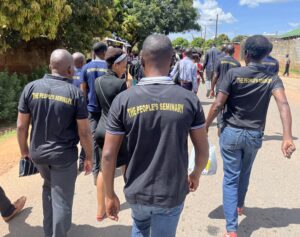 When Gracie and I lived in rural Honduras in the 1980s we were deeply impacted by the education gap between ourselves and the people there. We had recently graduated from university at age 24 and 22. In those days it was rare to find any Honduran who had gone past third grade. A huge percentage of rural Hondurans were illiterate.
When Gracie and I lived in rural Honduras in the 1980s we were deeply impacted by the education gap between ourselves and the people there. We had recently graduated from university at age 24 and 22. In those days it was rare to find any Honduran who had gone past third grade. A huge percentage of rural Hondurans were illiterate.
We learned to teach sustainable farming and preventative health in ways that were hands-on, simple but not simplistic. When we began offering Bible studies we quickly discovered that reading shorter portions of Scripture, identifying local equivalents to biblical locations, characters, and Jesus’ liberating message, required deliberation and creativity. We saw that acting-out Biblical stories made them much more understandable, relevant and fun. This has marked our ministry up to the present.
We were and continue to be inspired by Jesus, who seems to have mostly taught outdoors (as we did in Honduras)– on mountainsides, along the seashore, roadsides, and also in places of worship (synagogues and the temple).
Paulo Freire’s writings on educating for critical awareness, the contextual Bible study innovators like Carlos Mesters and Gerald West inspired us. The People’s Seminary was born under the shade of mango trees, on the slopes of corn fields and in humble homes.
We pursued graduate studies with the objective of making quality education accessible to the poor and excluded. Now, The People’s Seminary is the training arm of Tierra Nueva. Locally we equip people to read the Bible for personal and social transformation, with a focus on the incarcerated, addicted, unhoused and recovering addicts.
We’ve developed our Certificate in Transformational Ministry at the Margins (CTMM), consisting of three modules (42 sessions) which can be delivered in four days per module. We have now completed 32 full CTMMs to around 2,000 people in 19 countries.
Last week we returned from Zambia and South Africa, where we offered the third of three modules, “The Word on the Street: Transformational Bible Study, Justice and Peacemaking.” This module focussed on helping people read the Bible closely and in direct rapport with their lives.
Much of this last module involved breaking up the larger group of 250 participants (in Zambia), and 30 plus in Cape Town, into smaller groups to discuss stories from the Bible that addressed social issues like racism (Acts 10), sexual violence (the rape of Tamar), retributive violence (Luke 6), hospitality to strangers (Genesis 18-19) and liberating messages from the Gospels. Whenever possible we acted out Biblical texts– which was a lot of fun and made the Scriptures come alive.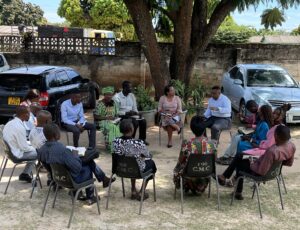 In Zambia we came with a team of nine trainers, each of whom had already graduated from CTMMs in their countries, including three from Zimbabwe, three from Mauritius, one from Winnipeg, and Gracie and I (photo below). Our objective is to develop more and more teams to offer new CTMMs (without us) in other countries where we are invited.
In Zambia we came with a team of nine trainers, each of whom had already graduated from CTMMs in their countries, including three from Zimbabwe, three from Mauritius, one from Winnipeg, and Gracie and I (photo below). Our objective is to develop more and more teams to offer new CTMMs (without us) in other countries where we are invited.
 Already, my brother Andy has offered numerous CTMMs in Kenya and Uganda together with a team of African trainers through his Beautiful Gate Ministries.
Already, my brother Andy has offered numerous CTMMs in Kenya and Uganda together with a team of African trainers through his Beautiful Gate Ministries.
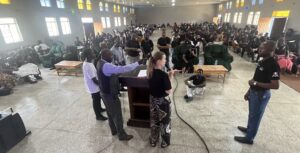
National host communities provide the venue, do all the on-the-ground organizing, including meal preparation, worship and local transportation.

 Our main objective is to offer training to people who normally would have little to no access due to lack of qualifications, finances or remote locations. For theological education and ministry training to be accessible, we must go to where the people are– whether that be a prison cell, an African village or an impoverished slum.
Our main objective is to offer training to people who normally would have little to no access due to lack of qualifications, finances or remote locations. For theological education and ministry training to be accessible, we must go to where the people are– whether that be a prison cell, an African village or an impoverished slum.
After our trip to Zambia we traveled to Cape Town, where we offered our final module to the Tree of Life community, which works with young women and men coming out of gangs in the township of Manenberg.
Street ministry with Tree of Life team in Manenberg (above). Graduates from Tree of Life CTMM (below). We were deeply touched by a final graduation ceremony organized by the Zambian Bishop Boyd, who hosted us. Most of the graduates had never received a formal certificate for any kind of training. Many had not gone beyond sixth grade.
We were deeply touched by a final graduation ceremony organized by the Zambian Bishop Boyd, who hosted us. Most of the graduates had never received a formal certificate for any kind of training. Many had not gone beyond sixth grade.
This ceremony was complete with marching band (see video below), and caps and gowns for the nine of us trainers. Somehow our host had come up with their own resources to have tee shirts printed for every participant. We learned that the band members played in exchange for a simple lunch!
Currently we are preparing new CTMMs in Burundi (beginning late August), Lesotho and Malawi (September). We are also offering Zoom trainings for Christians in the underground church in Iran. Our vision includes:
- Expanding our Certificate in Reading the Bible for Liberation to more inmates in the Washington State prison system and beyond, using my Guerrilla Gospel and Guerrilla Bible Studies series.
- Offering more Zoom and online training to people in restricted countries.
- Expanding CTMMs in Francophone Africa.
- Starting new CTMMs to train ministry workers serving excluded populations in the West.
- Continue publishing books, manuals and other training resources through The People’s Seminary Press.
Check out our online courses, including the CTMM, here.
Sign up for CTMM Module 3, “Word on the street: transformational Bible study, social justice & peacemaking,” beginning April 9 here.
Please consider helping us fund these trainings, which involve covering travel expenses for trainers, manuals and one meal per day for course participants. You can contribute online here, or by sending a donation earmarked The People’s Seminary to PO Box 410, Burlington, WA 98233.
- « Previous Page
- 1
- 2
- 3
- 4
- …
- 26
- Next Page »
